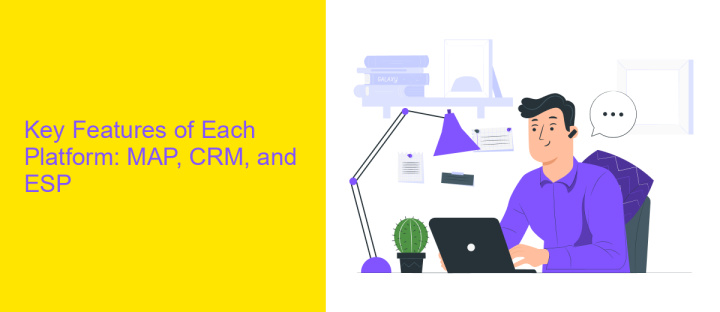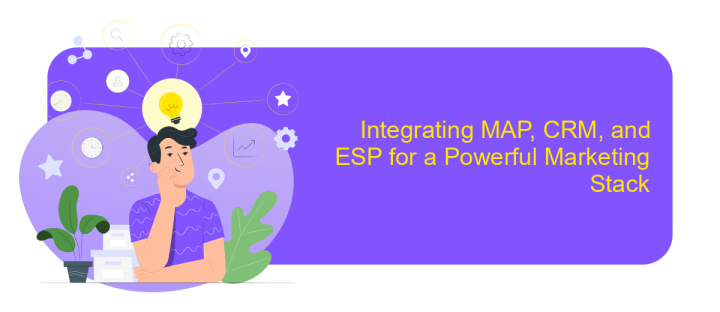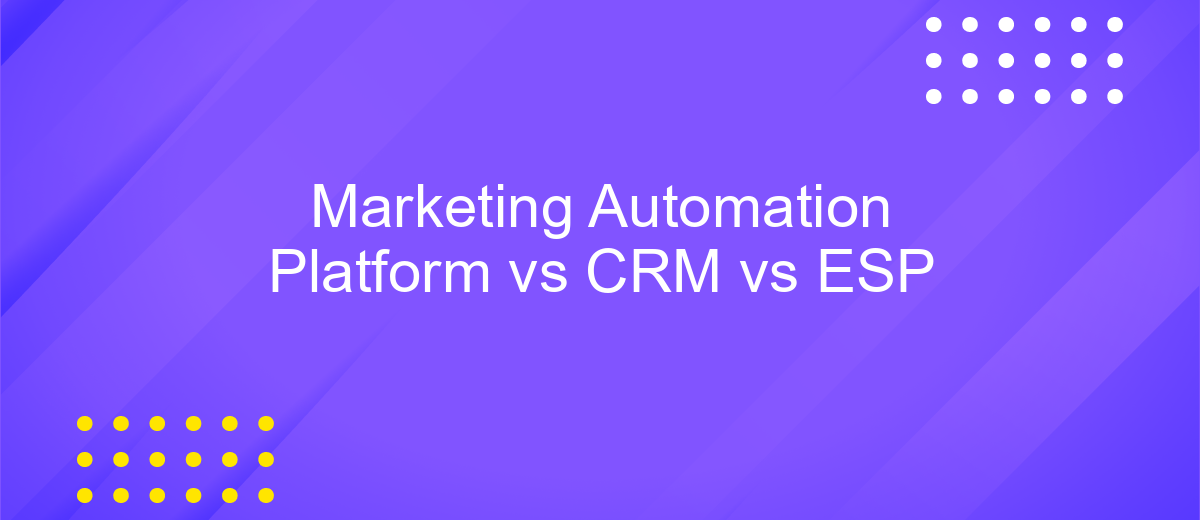Marketing Automation Platform vs CRM vs ESP
In the rapidly evolving digital landscape, businesses are constantly seeking tools to streamline operations and enhance customer engagement. Marketing Automation Platforms (MAPs), Customer Relationship Management (CRM) systems, and Email Service Providers (ESPs) each offer unique capabilities to address these needs. Understanding the distinctions and synergies among these technologies is crucial for organizations aiming to optimize their marketing strategies and foster meaningful customer relationships.
Understanding the Core Differences: MAP, CRM, and ESP
Marketing Automation Platforms (MAP), Customer Relationship Management (CRM) systems, and Email Service Providers (ESP) are essential tools in modern marketing, each serving distinct purposes. Understanding their core differences can help businesses optimize their marketing strategies effectively.
- MAP: Primarily focuses on automating marketing tasks such as email campaigns, social media posting, and lead nurturing. It allows marketers to streamline workflows and measure campaign success.
- CRM: Designed to manage and analyze customer interactions throughout the customer lifecycle. It centralizes customer data, facilitating better customer service and relationship management.
- ESP: Specializes in sending bulk emails and managing email campaigns. It provides tools for designing emails, segmenting lists, and tracking email performance.
While MAP, CRM, and ESP each have unique functionalities, they can be integrated to enhance overall marketing efforts. MAP automates repetitive tasks, CRM builds deeper customer relationships, and ESP ensures effective communication. By leveraging these tools together, businesses can create a cohesive marketing strategy that drives engagement and growth.
Key Features of Each Platform: MAP, CRM, and ESP

Marketing Automation Platforms (MAPs) offer a suite of tools designed to streamline and optimize marketing efforts. Key features include lead nurturing, automated email campaigns, and behavior tracking. These platforms excel in segmenting audiences and delivering personalized content, enhancing customer engagement. Additionally, MAPs often integrate seamlessly with other tools, such as CRM systems, to provide a comprehensive view of customer interactions. Services like ApiX-Drive can facilitate these integrations, ensuring smooth data flow between platforms.
Customer Relationship Management (CRM) systems focus on managing and analyzing customer interactions throughout the customer lifecycle. Essential features include contact management, sales automation, and customer support. CRMs help businesses build stronger relationships by providing insights into customer behavior and preferences. On the other hand, Email Service Providers (ESPs) specialize in sending bulk emails and managing subscriber lists. They offer features like email templates, A/B testing, and deliverability tracking. ESPs are ideal for businesses looking to execute large-scale email campaigns efficiently. Together, these platforms provide a holistic approach to managing customer relationships and marketing efforts.
Use Cases and Ideal Scenarios for Each Platform

Marketing automation platforms, CRMs, and ESPs each serve distinct roles in modern business operations, tailored to specific needs and scenarios. Understanding their unique applications can help businesses optimize their strategies effectively.
- Marketing Automation Platforms: Ideal for businesses aiming to streamline repetitive marketing tasks, nurture leads through automated workflows, and analyze marketing performance. These platforms are best suited for companies with complex marketing campaigns requiring personalized customer journeys.
- CRM Systems: Perfect for organizations focused on managing customer relationships, tracking sales interactions, and improving customer service. CRMs are essential for sales-driven businesses seeking to maintain comprehensive customer profiles and enhance customer satisfaction and retention.
- Email Service Providers (ESPs): Best for businesses that need to manage large-scale email campaigns, segment audiences, and track email performance metrics. ESPs are crucial for companies prioritizing direct communication with customers through targeted email marketing.
By leveraging these platforms in their ideal scenarios, businesses can achieve enhanced efficiency, improved customer engagement, and ultimately, drive greater success in their marketing and sales efforts.
Integrating MAP, CRM, and ESP for a Powerful Marketing Stack

Integrating a Marketing Automation Platform (MAP), Customer Relationship Management (CRM), and Email Service Provider (ESP) can significantly enhance your marketing stack's efficiency and effectiveness. Each tool has its strengths, but when combined, they create a seamless ecosystem that streamlines processes, improves customer engagement, and drives better results.
Start by ensuring that these systems can communicate with each other smoothly. This integration allows for a unified data flow, providing a comprehensive view of customer interactions and marketing performance. It also ensures that your team can access and leverage this data to make informed decisions and personalize marketing efforts.
- MAP automates repetitive tasks and nurtures leads through targeted campaigns.
- CRM manages customer data and interactions, ensuring a personalized experience.
- ESP handles email marketing, delivering tailored messages to the right audience.
By integrating these platforms, businesses can optimize their marketing strategies, reduce manual workload, and enhance customer satisfaction. The synergy created by this integration leads to more effective campaigns, increased conversion rates, and a stronger return on investment. Embrace this powerful combination to stay ahead in the competitive marketing landscape.


Choosing the Right Platform(s) for Your Business Needs
When deciding between a Marketing Automation Platform, CRM, or ESP, it's crucial to evaluate your business needs and objectives. A Marketing Automation Platform is ideal for businesses looking to streamline and automate their marketing campaigns, providing tools for lead nurturing, segmentation, and analytics. CRM systems, on the other hand, are best suited for managing customer relationships and sales pipelines, offering features that track interactions and sales opportunities. If your primary focus is on email marketing, an ESP will provide robust tools for designing, sending, and analyzing email campaigns.
Consider the possibility of integrating these platforms to maximize their benefits. For seamless integration, services like ApiX-Drive can be invaluable. ApiX-Drive allows you to connect different platforms effortlessly, ensuring that data flows smoothly between your Marketing Automation Platform, CRM, and ESP. This integrated approach not only enhances efficiency but also provides a comprehensive view of your customer interactions, enabling more informed decision-making. Ultimately, the right choice depends on your specific business goals and the functionalities you prioritize.
FAQ
What is the main difference between a Marketing Automation Platform and a CRM?
How does an Email Service Provider (ESP) differ from a Marketing Automation Platform?
Can a CRM system replace a Marketing Automation Platform?
How can I integrate my CRM with a Marketing Automation Platform or ESP?
Why should businesses consider using both a CRM and a Marketing Automation Platform?
Apix-Drive will help optimize business processes, save you from a lot of routine tasks and unnecessary costs for automation, attracting additional specialists. Try setting up a free test connection with ApiX-Drive and see for yourself. Now you have to think about where to invest the freed time and money!

